The Final Flight Of Atlantis And The Future Of Space Travel
A space shuttle lifted off for the last time on Friday, and some people seem to think its the beginning of the end of America.
Last Friday, the Space Shuttle Atlantis lifted-off for what will be the final flight of America’s space shuttle, a program that was in the planning stages while we were still sending men to the moon, and which never really lived up to the hype that surrounded it when Columbia first blasted off in 1981. In addition to nostalgia, though, the launch of Atlantis has also been accompanied by assertions from some that the end, at least for now, of America’s manned space flight program is somehow a crisis for the nation:
In the wake of NASA’s final shuttle launch Friday morning with the space shuttle Atlantis, many critics are expressing doubt over NASA’s future now that the 30 year shuttle program has come to an end.
“If God had meant for us to travel into deep space, he would have given us more money,” says space expert John Pike of globalsecurity.org.
Pike, a bespectacled, bearded self-described “space cadet” who is known for the rare qualities of being able to decipher both space science and Washington politics, is deeply pessimistic about the future of NASA and the loss of America’s pioneering spirit. “Americans are a pioneering people,” he said.
“For four centuries we were pioneering the horizontal frontier of the west, at the beginning of the 20th century we started to pioneer the vertical frontier and that took us from Kitty Hawk to Tranquility Base. I think that the piloted space flight program is about the American myth and without human space flight I think that the country would be impoverished and we’d really have to reexamine what it is to be Americans.”
Today, the 135th and final shuttle mission launched from Cape Canaveral. It marked not only the end of the expensive and limited space shuttle program, but the end of America’s manned space program. With Barack Obama canceling the Constellation Program last year, America has ended exactly 50 years of manned space flight, stretching back to Alan Shepard’s May 5, 1961 sub-orbital flight in Freedom 7. That half-century witnessed the triumph of American technological and industrial progress, including the capstone Apollo program.
Yet stop for a moment and consider that between Alan Shepard and the space shuttle, just two decades passed. From the very first steps at manned flight to landing on the moon to the concept of the reusable orbiter took only 20 years Since Columbia’s first flight in 1981, exactly thirty years, there have been no breakthroughs in manned space flight. And now, America has retired from the manned space game.
There’s no question the manned space program has been extraordinarily expensive and in many cases wasteful.
(…)
Societies do not thrive when restricted by government regulation or a lack of leadership to tackle new challenges. They thrive when scientists, entrepreneurs, and ordinary citizens have a sense that the new and unknown is within their grasp, and when they are encouraged to reach to the stars. Waste and mistakes occur all the time, but there is a fundamental difference between spending money to pay back political supporters and spending money to push the boundaries of human knowledge and achievement. NASA may need to be rebuilt from the ground up, but surrendering the dream of manned exploration of space is certain to bring only a further sense that under this president, America is eager only to embrace mediocrity and a poverty of human spirit.
And on Capitol Hill, Senator Marco Rubio, who is of course from Florida where the space program has been a huge employer over the years, asserted that the space program was a 21st Century equivalent of American Manifest Destiny:
“Whereas America once led the way to the moon, we now face the unacceptable prospect of limited options to simply get a human into orbit,” he continued. “We know that our commercial space partners are working to fill some of the gap in our human space flight capabilities, and that is a promising development that we should encourage. But we need NASA to lead.”
(…)
“When America was born 235 years ago, surely our founding fathers could not fathom that one day our people would fly amongst the stars,” he said. “But the truth is it has always been our destiny. In the 19th century, it became our manifest destiny to explore and push westward until the American land stretched from sea to shining sea. And once we reached as far west as we could, Americans had no choice but to gaze up to the sky and settle on the stars as our next frontier.”
Of course, what Rubio forgets here is that part of that history involved he U.S. going across the sea and annexing new territories against the will of their inhabitants. Is that what Rubio sees us doing if we make it Proxmia Centauri and find intelligent life there? Does he see us taking a planet and just running roughshod over whatever we find there the way Americans did as they made their way west in the 19th Century? The truth, of course, is that what Rubio really sees are the dollar signs of the money that would come to Florida from a renewed manned space flight program. There’s nothing wrong with that, of course. As a Senator from Florida it’s Rubio’s job to act in the interest of his state. Nonetheless, trying to frame it in the language of manifest destiny strikes me as more than just a little absurd.
As for Auslin’s argument, it is so bound up with nostalgia for an era that ended a long time ago that he really has no understanding of just how worthless the shuttle program had become by the time NASA officially announced that it was ending. When the Shuttle program was first announced, NASA’s plans for it were ambitious. More importantly, as Tim Sandefur puts it, the idea that America requires an expensive manned space flight program for it’s “national greatness” is just absurd:
What it means to be an American is infinitely better represented by Space Ship One than by a bureaucratic machine that is in many ways stuck in the 60s–and that takes money by force from people who would much rather spend it supporting themselves and their families than paying astronauts to ratchet down solar panels in free fall. Space exploration is very cool, but its civilian benefits are vastly exaggerated; it’s a big government corporate welfare scheme—not an essential principle of my Americanness.
Exactly. Would it be cool to spend billions of dollars that we don’t have to send men to Mars? Most assuredly it would, but what, exactly would we have accomplished. It’s been nearly 40 years since we last set foot on the moon and the manned space flight program has been stuck orbiting the planet over and over and over again. Our unamned program, meanwhile, has sent probes to Mars, the outer planets, a comet, and, most recently Mercury. Three probes that we launched in the 1970s — Pioneer 10 and Voyagers I and II — have traveled further than any other manned made object in human history and are still sending back data as the plunge into the unknown world of interstellar space. At our current rate of development, it will be centuries before human begins can accomplish anything similar to what our machines have been able to do for us.Wouldn’t it make more sense to invest money in this method of exploration while trying to find faster, cheaper methods of propulsion ?
Additionally, we are the point now where its time to consider the possibility that government may not be the best institution for finding and exploiting the next advances in manned space flight:
Since we won the first Space Race, people just aren’t interested in sending unmanned probes to Mars or astronauts up to the ISS. They want laser cannons and X-Wings, or at the very least, a manned mission to Mars or a space elevator. With decreased public interest, there is also less willingness to pay. I’ve spoken to more than a few people who are astonished that we pay millions to send people into orbit when there are a multitude of problems down on Earth they think we should be focusing on. I think that feeling is probably pretty commonplace, and thanks to that, nearly all space exploration in the United States is hamstrung, since politicians avoid that topic and focus on other things.
That’s why the free market can work—let the people who truly care about space exploration give their money and resources freely to the cause, while others who are less interested save their money and resources for other things they support. It’s a basic, win-win scenario, and the space industry is one of the areas where private enterprise has been really outperforming the government, and doing it publicly. The Ansari X Prize raised the bar for private and relatively cheap spaceflight, generating a ton of interest and introducing commerical astronauts to our world. Its sequel, the Google Lunar X Prize, is still on track to have private groups (not necessarily for-profits) put an unmanned lander on the Moon by 2015. Richard Branson, of course, is still pushing forward with Virgin Galactic, with over 300 wealthy tourists already signed up for its $200,000 jaunts; according to the Fédération Aéronautique Internationale, only 517 people total have been to space, so Branson will dramatically increase the astronaut population, in a way that NASA could only dream of. (And there are a lot of competitors trying to work out suborbital tourism, too.) Bigelow Aerospace—my personal favorite—has not one, but two space stations in orbit, both of which happen to be inflatable. (That’s right, we don’t need to go through super-expensive time consuming module construction, we just inflate a space station now. Available at your local Home Depot for 25% off.) And finally, there’s the darling of the space news media—SpaceX, founded by Pay Pal co-founder Elon Musk, and which recently received a $3 billion contract from NASA to launch “satellites and potentially astronauts into space.” (Naturally, the story worries that they may be “cutting corners,” but from the non-Euclidean mess that is government spaceflight, there are probably a ton of corners to be cut.)
Private space launches are the next big thing, and they’re far more likely than a government program to be innovative, and to find answers to questions that we can’t even think of right now. As we retire the final shuttle after Atlantis lands, its worth noting that it was a program designed in the 1970s, updated to some extent during the 1980s, and that technology has changed dramatically in the years since the first shuttle was launched. Government couldn’t adapt to those changes easily, but private industry can. Let’s give them a chance to try.
One thing to keep in mind is that this isn’t the first time that the United States will have taken a break from manned space flight. There was not a single American manned space flight from the 1975 Apollo-Soyuz mission until Columbia’s first flight in 1981. Six years without an American in space, while the Russians continued to shoot Soyuz capsules into orbit. And we survived as a nation. Something tells me we’ll be fine this time too.
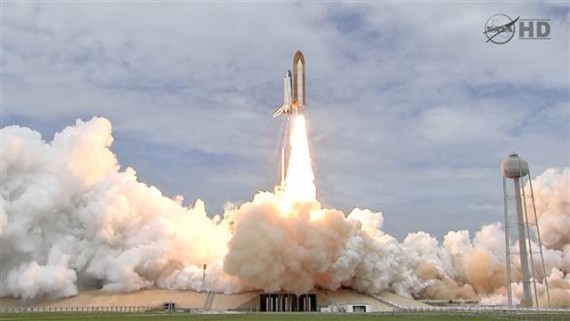

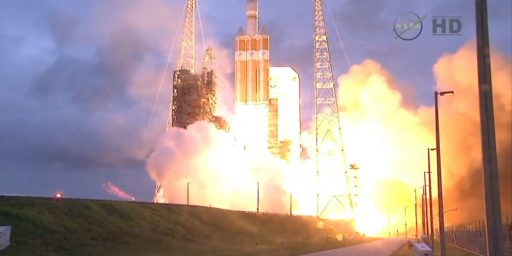
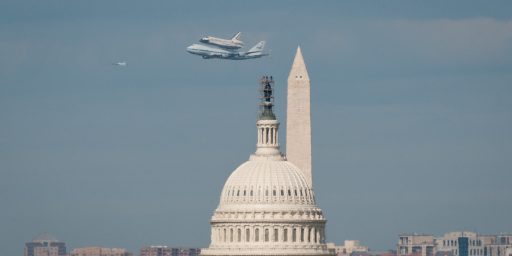
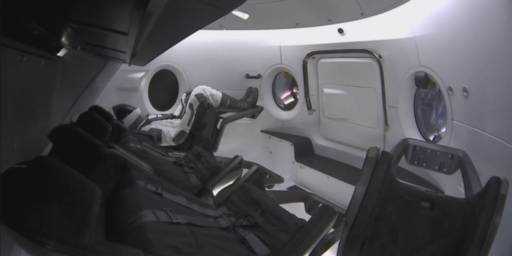
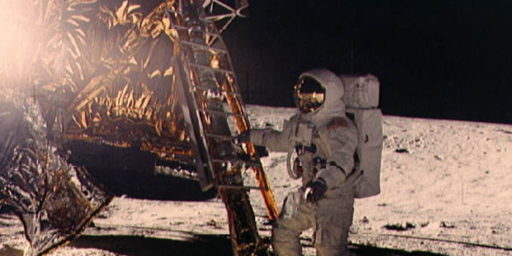
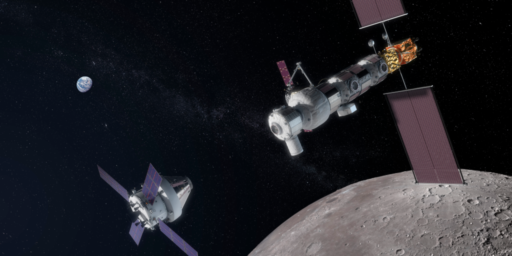
I think we get much more (scientific) bang for the buck from unmanned missions.
I have a soft spot for NASA, but it’s pretty hard to justify the spending given our current situation (unless the spending was actually for asteroid indentification and avoidance strategies, which I think would be a perfectly justifiable investment, but that’s not where most of the spending goes, is it?).
Had we continued the Constellation program we could have had a permanent settlement on the moon within a decade. A settlement on the moon would have been a learning stepping stone for Mars. We have to learn how to live on the moon so that we can apply that knowledge to places like Mars. There are resources on the Moon and Mars that would in long term help offset the dwindling limited resources we have here on Earth. While its great that private space travel is starting to get off the ground (so to speak) NASA still has a significant role to play in manned exploration.
The ISS should be turned into an orbital construction platform for the next generation of manned spacecraft.
not that i profess to know anything about ongoing NASA programs or space exploration in general, but that was my reaction to all the gnashing of teeth about ‘loss of prestige’ from manned spaceflight. i see it not as an abandonment of our space program, but as a shift in focus and direction. i could be wildly off base, but i see a parallel in the military with the increased reliance on unmanned drones.
I am of mixed emotions on this. I, for certain, do not feel that this is the time to invest in manned space flight, much better to have more Mars rovers (we have gotten better at that) and Cassini’s… There is sooo much we can do with robotic missions, BUT….
The James Webb telescope is on the chopping block.
It is all fine and dandy to talk about the “possibilities” for private industry but if you think anything beyond “space tourism” in a low earth orbit will be profitable any time soon…. I got a bridge to sell, some land in Florida, etc.
Look, the JW telescope will never return a profit any more than the Mars rovers or Cassinni. But we will get a return on our investment. You just can’t measure that return in dollars and cents.
And that is why I fear for the Space Program. Gov’t needs to be invested in the “Final Frontier”. Imagine how different our world would be if Ferdinand had told Columbus or Magellan “No.” Yes these continents would have been explored, but they would have ended up a far different place.
To clarify, they did not have robots in 1492. My arguement is that we do need to invest in exploration of space, just not necessarily manned exploration. My fear is that without the “manned” before the “exploration”, it won’t get done.
@Vast Variety:
Constellation was a money pit that was years from launching anyone into orbit let alone the moon. BEst guess was first human launch would be around 2020. You know the Altair lunar lander had been defunded several years ago to steer more funding into the Ares I rocket? That cuts out the moon. They were only going to go twice a year for a couple of weeks anyways. Bases were kicked around but no plans or funding were set.
The ISS is in the wrong orbit to launch anything out of earth orbit. Too high of an inclination and that would waste too much fuel to make it workable. It was done so the Russian supply ships could reach it easier. Now they could use it to test things like improved solar panels, inflatable modules, etc.
There are resources in space to be sure but is it cost effective to try and bring them down to Earth? Say from Mars you first have to find them and then launch them. Wouldn’t it be easier to find them or recycle on Earth? Asteroids could give you all the iron/nickle that you could ever want but is it cost effective? There are things like platinum group metals or Rare Earths that could be used. Most resources though would be better served for use in space. I’ve seen concepts for a boot-strap smelting and industry on the Moon with a few hundred tons worth of starter equipment from the Earth.
If NASA is to have a place in the future of space it isn’t building rockets and hauling groceries into orbit. Its leaving that to private companies and going for deep space.
American should just get it through its head that we have become a country of social workers, lawyers, government employments, and bankers. The idea that we are going to go anything big n the future if laughable. Putting lawyers in charge means that nothing big will ever occur again and in a few years we will all be so afraid of our own shadows that we will no longer be considered a part of the developed world.
We had the Shuttle program in development to replace it for most of that gap. Obama cancelled the replacement for the Shuttle (Orion and the Ares lifters), in favor of essentially nothing but a vague future project that isn’t even on the drawing board yet. That’s a recipe for disaster in terms of losing our institutional experience in manned spaceflight as the engineers and people who work in NASA drift on to other work.
20 years on, and we’ll have to do the whole thing from the ground up again. At least with the Shuttle we kept that institutional experience after the cancellation of the last few Apollo missions.
Not really. SpaceX, for example, is just re-inventing the wheel on getting into LEO. Nothing it has done is innovative compared to what Orion and Ares would have done in terms of payload, time spent in orbit, or destination. Nor have they successfully launched a person into orbit.
In any case, we still need NASA and the government programs if we ever want to have colonies off-world. Virtually the entire commercial space industry (including the manned craft in development) is centered around LEO and GST activity. There’s extremely small profit (if any) to cover the “gigantic”* costs involved in settling beyond those orbits, which means that it simply won’t be done anytime soon.
* I say “gigantic” in parenthesis because the costs are actually quite small over the time period in question, compared to some of the other stuff the US spends money on. Ares and Constellation was something like $2-3 billion a year, which is less than the US spends on bloody corn subsidies if I recall correctly. They’re only big for private investors.
I think the space program issue, is a great example of how unserious the Republicans are about actually cutting federal spending. You can’t get much more non-essential than spending billions of dollars so government employees can make circles around the earth as part of some international “Who’s got the biggest tech penis?” competition. Indeed, you’d think they’d be championing this as an oppurtunity for the private sector (via companies like Scaled Composites or Space X) to show how much better it can do things that the government given the chance.
There is a problem though. Aside from Mars, and maybe, possibly a few moons of Jupiter or Saturn, there is literally nowhere to land for any human, anywhere in space.
Unless we figure out how to get through a worm hole, we are pretty stuck here in our solar system. It has taken Voyager 30 years to get to the edge of our solar system – the next nearest star is 4 light years away – which means it would take tens of thousands of years to get there.
What would it take to build spacecraft that could support human life for tens or hundreds of thousands of years, and even then, with no hope of being able to do anything there, other than look around – something which unmanned vehicles can do just as well, if not better.
Our minds have been deeply shaped by generations of science fiction – its time to actually articulate some vision of what can realistically be accomplished by a deep space program. Lets go to Mars, by all means, when we can afford it. And Europa – that would be a way cool place to explore.
But beyond that…..what, realistically? I’d love to hear some ideas….
@superdestroyer:
Good thing none of the Founding Fathers were lawyers.
I found this story particularly interesting given how it details how Obama has started the privatization of NASA, which, of course, the GOP is now soundly rejecting:
http://www.reuters.com/article/2011/07/11/us-space-shuttle-station-idUSTRE76A5OO20110711
My thoughts:
– NASA got too focused on designing big plans with congressional appeal.
– NASA tried to do science with spare monies from those big plans.
– Space had fewer short-term opportunities than dreamed.
– Space’s long-term opportunities are horribly expensive.
– Those long term opportunities will, by definition, be there in a decade or six.
It is really bizarre that the Republicans of all people got trapped into the wrong interpretation of those bullet points, and started thinking that the horrible expenses of a long-term mars mission was somehow justified. I mean it’s crazy. Again, it’s a plan designed to get maximum money.
If you wanted science, you’d baby-step to a permanent L5 colony, or a moon base. Why does no one talk moon bases anymore?
(Do mars-mission backers know what L5 is?)
BTW, I think space’s short-term opportunities are all earth-centered. Basically, it’s all about the satellites – and I think it would be great if that portion can be privatized.
@Timothy Watson: When you say “soundly” rejecting, do you mean that their logic is sound or are you referring to the volume of their objection?
@Herb: Volume
@Tano:
Europa is cool but its stuck in the middle of Jupiter’s radiation belt. Without a lot of shielding it would be like working inside an operation nuclear reactor. I’d rather go to Titan. Nice thick atmosphere, thicker then Earth’s, so your suit would be mainly to keep you warm and let you breath.